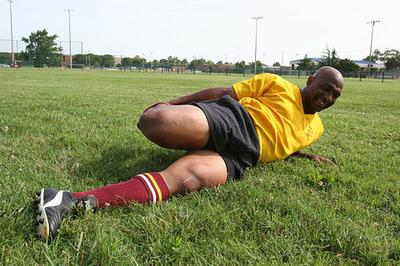For your good health. Always.
Menu
Enhance your health with free online physiotherapy exercise lessons and videos about various disease and health condition
How to avoid sports injuries
Pre-hab is better that Re-hab
Sometimes, avoiding common sports injuries is beyond our control, but many times sports injuries are preventable. People bring a lot of injuries because they are not conditioned for the activity.
Here are some simple tips one can follow to avoid sports injuries:
Workout daily: To condition the body for sports, one must work out daily in graduated exercise programs relevant to the sports they play.
Avoid overuse of muscles: This can be prevented by following a simple tip "Don't come out and hit the track and field for an hour after not playing for a while."
Recognize your own pain: Pain indicates an underlying problem and it is a warning sign; do not play through the pain.
Listen to your body: One should stop when fatigued; muscle fatigue takes away all your protective mechanisms and really increases your risk of injuries.
Start with gentle warm up: Every workout should start with a gentle warm-up exercise regime.
Pre-participation training: One must do some pre-participation training by lightly working the relevant muscle groups in the weeks before the activity.
Gearing up: It's important to wear protective gear such as helmets, gloves, protective pads, shin pads and other gear; warming up and cooling down; knowing the rules of the game and to stop playing when you're injured.
Hydrate yourself: It is also crucial to hydrate adequately to maintain health and minimize cramps.
Learn a sport: Don't rely on the sport to get you into shape. Your first priority should be to learn the sport, and then treat toning up as an added benefit.
Healing sports injuries:
Keep in mind that swelling is a normal response to sports and workout injuries. You can limit swelling and start healing faster after most sports injuries by using the RICE principle.
R-Restrict activity: This will prevent worsening of the injury.
I-apply Ice: Use ice for 20 minutes every 1-2 hours for the first 48 hours after the injury. Do not use heat during this time as it encourages swelling and inflammation.
C-apply Compression: Compression with an elastic bandage will help reduce swelling.
E-Elevate the injured area: Elevating the injured area above the heart will also reduce swelling.
In order to prevent further worsening and harmful effects of an injury, it is also important to know when to seek medical attention. If you have any signs such as deformities in the joint or bone which makes it look crooked or moves abnormally, you are unable to bear weight or can't use the limb without it 'giving way', excessive swelling, not getting any better after a few days of RICE therapy, you need to see a doctor.
- Lateral Epicondylitis
- Medial Epicondylitis
- Piriformis Muscle Syndrome
- Osteitis Pubis
- Iliotibial Band Friction Syndrome
- Quadriceps Strain
- Shin Splints Treatment
- Chronic Achilles Tendonitis
- Achilles Tendon Tear
- Ankle Sprain Treatment
- Treatment For Plantar Fasciitis
- Hallux Limitus
- Turf Toe
- ACL Knee Injury
- Snapping Hip Syndrome
- Scapular Dyskinesis
- Tennis Leg
Comments for How to avoid sports injuries
|
||
|
||
|
||
|
||
|
||
|
||
|
||
|
||


